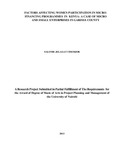| dc.description.abstract | Microfinance firms act as agents of women economic empowerment through offering loans to
women. Statistics from the micro-financing instututions in garissa shows that few women
participate in borrowing loans in Garissa town, an implication that women in Garissa may not
enjoy economical empowerement in near future if no action is taken. This study therefore was
set to assess the factors affecting women participation in micro-financing programmes. The
objectives of the study focused on, the effect of culture, personal characteristicst and legal
framework on women participation in micro-financing. The study adopted a descriptive
survey design and the data was collected by use of a questionnaires and interview guide for
key informant who included the Bank Managers. The target population consisted of 240
women entrepreneurs who operate small businesses in Garissa town and the sample size
comprised 148 respodents. The instruments were Pilot-tested to ascertain the content, construct
and face validity. Descriptive statistics used include frequencies, percentages, means and standard
deviation. Inferential statistics used include: pearson product-moment correlation . Tests of
significance was tested at α=0.05. The Statistical Package for Social Science (SPSS) in data analysis.
The study established that there are several cultural factors such as, women having no right to
own property, women being treated as property, male chauvenism, Marriage style, family
size, gender stereotype, Women’s negative attitude, family type and inheritance practices
which affects women participation in micro-financing. The study also established that there
are personal characteristics such as one’s level of education as attested by 87% of the
respodents, religious affiliation, political affiliation and social networking which affect
women participation in micro-financing. Lastly on legal and regulatory framework had
significant relatioship with participation of women in micro-financing programme, the study
established that 65% of the respondents said that they do not have equal right of share of
property with men. The study therefore recommeded that,The government agents should be
more active on training women on need to take loans for economic development and come up
with policies that empower women economically by emphasizing on loan borrowed. The
study suggests other studies on the determinants of women economic empowerment in Kenya
for comparative purpose and the coping mechanisms that women employ to survive economic
times to be carried out to suppliment the findings of this study | en |

